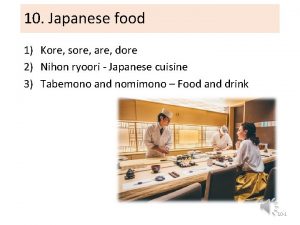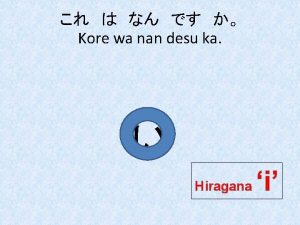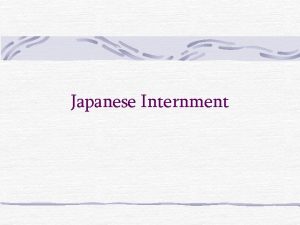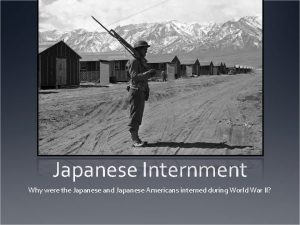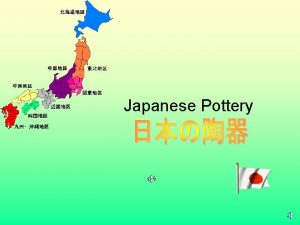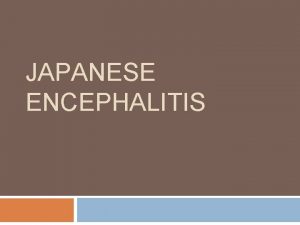10 Japanese food 1 Kore sore are dore








![References [Illustrations]. Retrieved June, 2019 from https: //www. ac-illust. com/ [Photographs]. Retrieved June, 2019 References [Illustrations]. Retrieved June, 2019 from https: //www. ac-illust. com/ [Photographs]. Retrieved June, 2019](https://slidetodoc.com/presentation_image/00ed5aadad76a8357801d63d9f61396a/image-9.jpg)
- Slides: 9

10. Japanese food 1) Kore, sore, are, dore 2) Nihon ryoori - Japanese cuisine 3) Tabemono and nomimono – Food and drink 10 -1

1). Kore, sore, are, dore kore this one I have sore that one by you are that one over there dore which one A: Sore wa nan deska? B: E? Dore deska? A: Sore des. B: Aa, kore deska? Kore wa kinoko des. Doozo. A: What is that you have? B: What? Which one? A: That one you have. B: Oh, this one? This is a mushroom. Here you take it. 10 -2

2). Nihon ryoori - Japanese cuisine Left soba raamen yakisoba udon Middle sashimi sushi sukiyaki okonomiyaki Right katsudon gyuudon tenpura teeshoku 10 -3

Here are some adjectives that are useful when talking about food. A: Are wa nan desuka. B: Are wa gyooza desu. A: Nihon ryoori desuka. oishii delicious mazui tastes bad karai spicy Adding “ryoori” after the country name makes it a cuisine of that country. But Chinese cuisine is “chuuka ryoori” rather than “chuugoku ryoori. ” B: Eeto. Chigaimas. Gyooza wa Nihon ryoori ja arimasen. Chuuka ryoori desu. A: Soo desuka! Oishii desuka. B: Hai, oishii desu. Suki desu. amai sweet suki like kirai dislike Althouth "like" and "dislike“ are verbs in English, they are adjectives in Japanese. A: What is that over there? B: That is gyooza. A: Is it Japanese food? B: Well. It is not. Gyooza is not a Japanese food. It is a Chinese food. A: Really! Does it taste good? B: Yes, it is delicious. I like it. 10 -4

Check if you can do this! q Ask what each cuisine is and ask another related question. Example: A: Are wa nan desuka? B: Are wa karee desu. A: Nihon ryoori desuka. B: Iie. Indo ryoori desu. A: Oishii desuka. B: Hai, oishii desu. Demo karai desu. Here are some conjunctions at the beginning of the sentence. demo soshite but and a) b) c) d) 10 -5

3) Tabemono - Food yasai vegetable ringo suika ichigo banana meron momo mikan niku meat kudamono fruit 10 -6

and Nomimono - Drink The word “osake” or “sake” in Japan can indicate all kinds of alcohol drinks. “Japanese sake” made of rice is called “nihonshu” in Japan. koocha koohii gyuunyuu juusu The word “ocha” can be used to mean any kind of tea, too. ocha 10 -7

q Check if you can do this! With your partner, sort the food and drink items below into categories and ask related questions. Speak only Japanese when you do this activity. Categories: yasai, niku, kudamono, sake, ocha, and tansan-inryoo soda/pop retasu jagaimo ramune tamanegi toriniku butaniku koora ninjin tomato 10 -8
![References Illustrations Retrieved June 2019 from https www acillust com Photographs Retrieved June 2019 References [Illustrations]. Retrieved June, 2019 from https: //www. ac-illust. com/ [Photographs]. Retrieved June, 2019](https://slidetodoc.com/presentation_image/00ed5aadad76a8357801d63d9f61396a/image-9.jpg)
References [Illustrations]. Retrieved June, 2019 from https: //www. ac-illust. com/ [Photographs]. Retrieved June, 2019 from https: //www. photo-ac. com/ 10 -9
